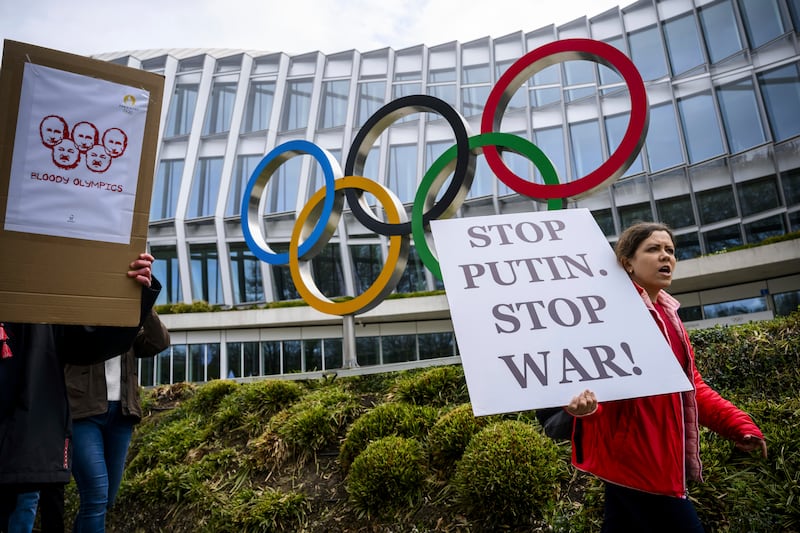International Olympic Committee President Thomas Bach had harsh words Thursday for countries critical of newly issued recommendations that would allow Russian and Belarusian athletes to return to competition despite the ongoing war in Ukraine.
“It is deplorable to see that some governments do not want to respect the majority within the Olympic movement and of all stakeholders, nor the autonomy of sport,” Bach told reporters Thursday, after three days of closed-door meetings by IOC leaders in Switzerland.
The IOC president also condemned what he termed “the double standards” of those who speak out against participation by Russians and Belarusians but not by athletes from countries involved in some 70 other wars and armed conflicts also underway.
And Bach said the IOC’s critics are also ignoring a “very clear statement” from a pair of United Nations human rights experts declaring Russian and Belarusian athletes are being discriminated against.
“It cannot be up to the governments to decide which athletes can participate in which competitions. This would be the end of world sport as we know it today,” Bach said. “The Olympic movement stakeholders are very concerned about this politicization of sport.”
Officials from several European nations lashed out after the IOC Executive Board recommended Tuesday that international sports federations permit Russians and Belarusians to participate as neutral athletes under “strict conditions.”

The conditions, first proposed earlier this year, include banning flags, national anthems or other identifiers of Russia or Belarus, as well as requiring athletes from those countries to not have supported the war or been “contracted” to the military or national security agency.
Polish Deputy Foreign Minister Piotr Wawrzyk said it was “a day of shame” for the IOC on Twitter, according to a translation of his tweet that also referred to some of the bloodiest battles in Russia’s invasion of neighboring Ukraine.
“What’s so positive about Russia that their athletes should participate in the competition‼ ️After Bucza, Irpieniu, Hostomel‼ ️After daily bombing of civilian facilities‼ ️It’s a day of shame for the IOC‼” Wawrzyk tweeted.
Czech Foreign Minister Jan Lipavsky said there’s no place for Russian athletes in a tweet expressing his disappointment in the IOC’s recommendations, which do not address whether Russians and Belarusians should compete in the 2024 Summer Games in Paris.
“We must not close our eyes to reality. Russian sport is centrally controlled from the Kremlin,” Lipavsky’s tweet said, according to a translation. “The Russian regime does not know what fair play is; (its) athletes do not belong in the Olympics.”
The Czech minister said his country will “continue to deal with the issue,” including through the Czech national Olympic committee.
Both countries had joined other nations in protesting the IOC’s reversal of its previous position adopted shortly after the start of the war in Ukraine more than a year ago that called for Russian and Belarusian athletes to be barred from international sports.
A U.S. official was among nearly three dozen nations that signed on to a British statement in February opposing the IOC’s shift in policy due to “strong concerns” about the feasibility of Russians and Belarusians competing as neutral athletes.
Bach said Thursday a decision on if Russians and Belarusians will be allowed at the Paris Games, as well as the 2026 Winter Games in Milan and Cortina, Italy, won’t come before the end of summer.
The IOC president said time is needed to monitor how well the recommendations work. He said it is up to each international sports federation to determine whether to follow the “pathway” laid out for Russian and Belarusian athletes.
Russia has already come out against the recommendations, Reuters reported Wednesday.
“The parameters as announced are absolutely unacceptable,” Russian Olympic Committee president Stanislav Pozdnyakov told a news conference, Reuters said, citing reports by Russian news agencies.
Bach, who also addressed the issue after Tuesday’s meeting, said again that the IOC has been accused of being both “an agent of the United States” by Russia and a Russian ally by Ukraine, where officials have talked about the possibility of an Olympic boycott.
“That both sides in this confrontation are not satisfied, to say, diplomatically, might indicate on the other hand that we have found some middle ground on which we can all move forward to make a contribution to understanding and peace through sport,” he said.
There was no mention of the race to host the 2030 and 2034 Winter Games during Thursday’s virtual news conference. On Wednesday, IOC Olympic Games Executive Director Christophe Dubi said the number of Winer Games bidders has increased.
But Dubi would not name the places that have not gone public, nor would he say how many more there are than the six previously confirmed by the IOC — Salt Lake City; Sapporo, Japan; Vancouver, Canada; and a possible Swedish bid, along with two unnamed locations.


